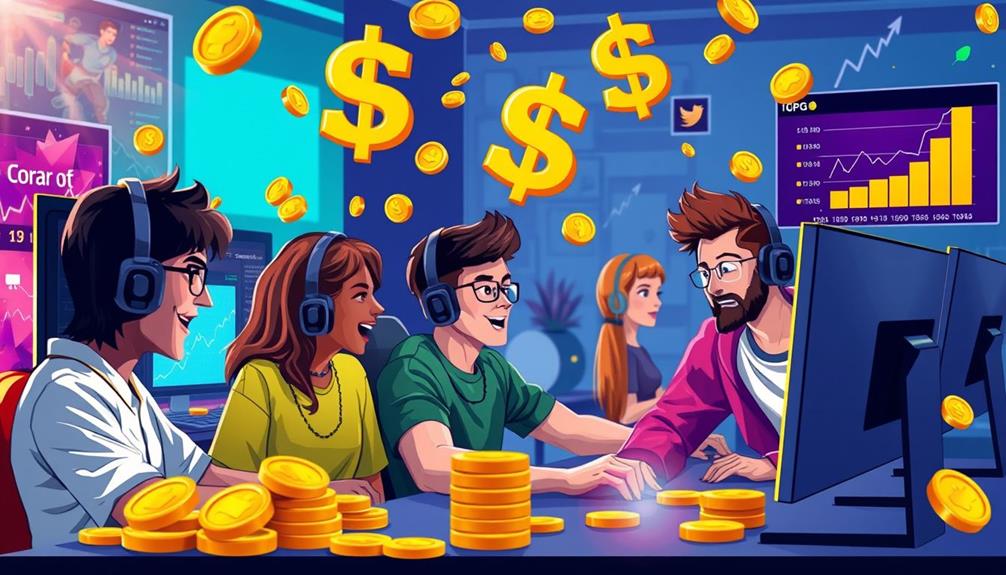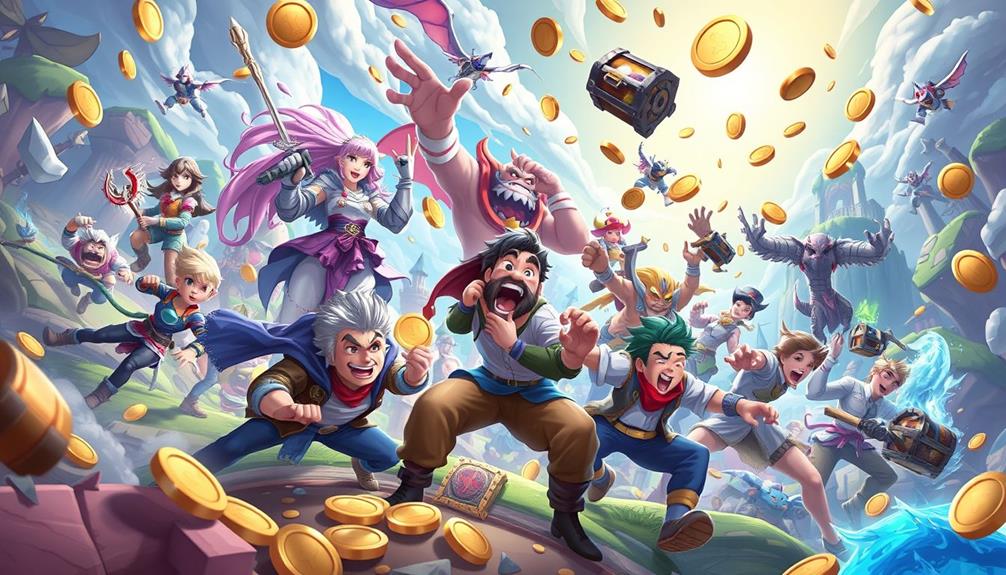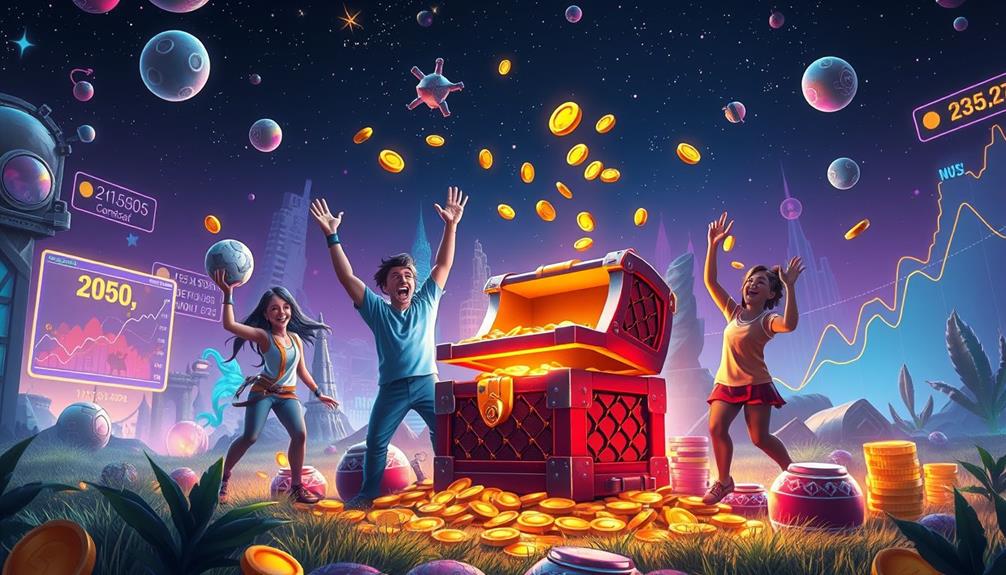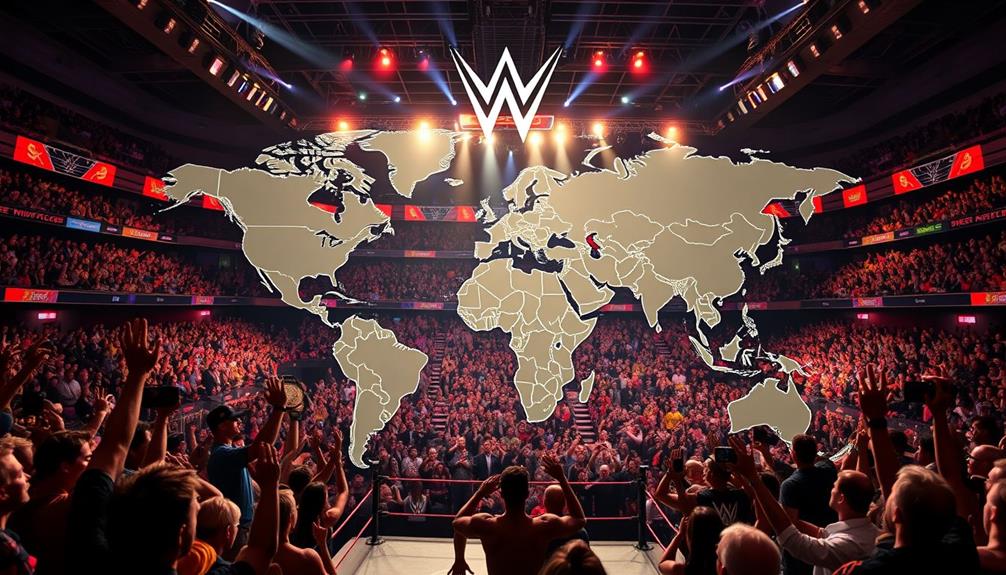Gamers are cashing in on the free-to-play boom, with lucrative opportunities popping up almost overnight. By leveraging effective monetization strategies like microtransactions and battle passes, players can earn impressive incomes from popular titles. With over 80% of global gaming revenue coming from these games, there's a massive potential for profit. If you tap into the right trends and engage creatively, you could attract hundreds of thousands of players enthusiastic to spend. Plus, frequent updates and community events keep players involved and coming back. Stick around, and you'll uncover the best strategies to boost your gaming income.
Key Takeaways
- Unity Free enables developers to create engaging, monetizable games without upfront costs, attracting a large player base for potential revenue.
- Successful F2P games leverage microtransactions and battle passes, allowing players to earn while developers monetize effectively.
- Community engagement, including frequent updates and events, enhances player retention and boosts opportunities for revenue generation.
- Gamers capitalize on in-game economies and trading systems, potentially generating real-world income through strategic gameplay.
- The rise of free crypto opportunities in gaming provides additional revenue streams for players willing to explore new monetization methods.
Understanding Free-to-Play Games
Understanding free-to-play (F2P) games is essential for grasping their impact on the gaming landscape. These games allow you to download and play without any upfront costs, making them incredibly accessible.
In fact, F2P games accounted for over 80% of global gaming revenue in 2023, showcasing their dominance in the industry. Unlike traditional pay-to-play models, the average revenue per user (ARPU) in F2P games is considerably higher, with popular titles like Fortnite leading the way in profitability.
You'll find that common monetization strategies in free-to-play games include microtransactions for in-game items, battle passes for seasonal content, and advertisements that generate revenue without directly charging you. This model not only keeps the initial cost at zero but also allows you to engage with the game as much or as little as you want.
The accessibility of F2P games attracts a large and diverse audience, catering to various player preferences through genres like mobile games, battle royales, and massive multiplayer online games (MMOs).
Effective Monetization Strategies

When you're looking to monetize your free-to-play game, microtransactions can be a game changer, often converting about 1% of downloads into substantial revenue.
You'll also find that battle passes not only boost engagement but create a steady flow of income by keeping players invested in seasonal content.
Microtransactions Driving Revenue
Microtransactions have revolutionized the gaming industry, driving revenue for free-to-play games in ways that traditional models can't match. These in-app purchases (IAP) are essential, with a typical conversion rate of just 1% from players.
If your game garners 1 million downloads, that means you could see significant earnings from a small fraction of paying users. For example, with an average IAP value of around $1, you could generate approximately $10,000 from just 10,000 paying users.
To maximize your revenue, consider implementing effective pricing strategies and enticing limited-time offers. These create a sense of urgency, nudging players to make quick spending decisions.
However, remember that while microtransactions can enhance your earnings, you must strike a balance between monetization and player experience. If your strategies feel too aggressive or intrusive, it could lead to negative perceptions, ultimately harming long-term engagement.
Battle Pass Popularity
Battle passes have emerged as a highly effective monetization strategy in the free-to-play gaming landscape. By offering exclusive seasonal content and rewards for a fee of $10 to $15, developers keep players coming back for more.
You're likely to find yourself drawn into the tiered reward system, where the more you play and complete challenges, the more rewards you earn. This structure not only enhances your gaming experience but also considerably boosts developer revenue.
In 2023, major titles like Fortnite and Apex Legends generated billions through battle passes. If you're one of the approximately 50% of players who purchase them, you might also find yourself spending additional money on in-game purchases throughout the season.
The sense of urgency and exclusivity that battle passes create pushes you to engage with the game more, ensuring you don't miss out on limited-time content.
As you immerse yourself in these seasonal experiences, remember that battle passes are more than just a payment model; they're a clever way to keep you invested and excited, ultimately leading to a richer gaming journey—and greater profits for developers.
Engaging Players for Success

To keep players coming back, you need to focus on retention strategies that work.
Engaging your community through events and social features not only builds connections but also boosts in-game purchases.
Player Retention Strategies
In the fast-paced world of free-to-play gaming, keeping players engaged is essential for success. Frequent updates can greatly enhance player retention, encouraging you to return regularly for new content. When developers introduce fresh experiences, it keeps the excitement alive and can lead to more in-game purchases, ultimately translating into money.
Implementing community events is another effective strategy. These events foster interaction and loyalty among players, creating a dedicated player base that feels valued. You'll find that participating in these events can deepen your connection to the game.
Reward systems that incentivize regular play through bonuses can also greatly increase your engagement. When you see tangible rewards for your time, it makes you want to keep coming back.
Customization options allow you to personalize your gaming experience, leading to a stronger emotional investment in the game. The more you feel it reflects your personality, the harder it's to walk away.
Lastly, social sharing features encourage you to invite friends and share experiences, expanding the game's reach. This not only enhances community engagement but also brings in potential new players, which can ultimately boost the game's revenue.
Community Engagement Techniques
Building a vibrant gaming community is essential for keeping players engaged and invested in your game. By employing effective community engagement techniques, you'll not only boost player loyalty but also create opportunities to make money.
| Technique | Benefits |
|---|---|
| Frequent Updates | Keeps content fresh, encouraging regular returns. |
| Community Events | Fosters interaction, creating loyalty and belonging. |
| Reward Systems | Incentivizes play with bonuses, enhancing engagement. |
Utilizing social sharing features empowers players to invite friends, expanding your game's reach and increasing your player base. Customization options allow players to personalize their experience, leading to a deeper connection with both the game and the community.
Implementing these techniques can turn casual players into dedicated fans, driving engagement metrics through the roof. When players feel a sense of belonging and investment, they're more likely to stick around and spend money, elevating their overall experience. Remember, a thriving community not only enhances player retention but also boosts your potential to make money. So, focus on these strategies to guarantee your game stands out in the competitive landscape!
Analyzing Market Trends

Frequent analysis of market trends reveals that free-to-play (F2P) games have solidified their position as a dominant force in the gaming industry. In 2023, F2P titles accounted for over 80% of global gaming revenue, underscoring their massive appeal.
If you're looking to tap into this lucrative market, consider the mobile gaming sector, which has seen explosive growth, with F2P games regularly topping app store charts. Their accessibility and broad audience reach are key factors driving this trend. Additionally, the rise of free crypto opportunities within gaming ecosystems may further enhance player engagement and revenue streams.
Successful F2P titles like Fortnite and Apex Legends showcase effective monetization strategies that attract millions of players. Through microtransactions and battle passes, these games generate substantial revenue, sometimes earning developers over $8,000 annually per user. This leads to million-dollar returns on investment for those who understand the market.
Moreover, traditional gaming companies are increasingly investing in F2P models, indicating a significant shift towards diverse monetization approaches.
Navigating Challenges and Criticisms

While free-to-play games have gained immense popularity, they're not without their challenges and criticisms. One major concern is the "pay-to-win" model, where players who spend money can gain significant advantages, leaving others feeling frustrated and alienated. This imbalance can hurt the community and diminish the overall gaming experience.
Addiction risks also loom large, as many players might overspend on microtransactions or feel pressured to play excessively just to stay competitive. It's essential for developers to balance monetization strategies with player experience; aggressive marketing tactics can breed negative perceptions and erode player loyalty.
Moreover, regulatory scrutiny regarding microtransactions, especially concerning minors, has prompted developers to rethink their approaches. You might find that maintaining player engagement while implementing these strategies is a significant challenge. Frequent updates and community events are vital to retaining a loyal player base amidst ongoing criticism.
Navigating these challenges requires careful consideration, as the success of free-to-play games hinges not just on profitability but also on creating a fair and enjoyable environment for all players. Balancing these aspects is key to thriving in the competitive gaming landscape.
Revenue Generation Insights

In the competitive landscape of gaming, understanding revenue generation is essential for developers and players alike. Free-to-play (F2P) mobile games dominate the market, accounting for over 80% of global gaming revenue in 2023.
If you've got a mobile game that hits 1 million downloads, you can expect to rake in about $8,000 annually from in-app purchases and ad revenue, even after platform fees.
With an average conversion rate of about 1%, that means roughly 10,000 users are likely to make a purchase. To maximize earnings, developers are leveraging diverse monetization strategies like microtransactions and battle passes, which can greatly increase revenue per user compared to traditional pay-to-play models.
Take a look at major titles like Fortnite and Apex Legends; their success illustrates the immense potential of F2P games. These developers can generate upwards of $1 million daily, showcasing how effective revenue strategies can lead to extraordinary profits.
Building a Supportive Community

Building a supportive community around your Unity development efforts can greatly enhance your game's potential. Regular engagement with community members fosters collaboration and knowledge-sharing, which leads to improved practices and innovation. By encouraging feedback, you help refine your project and address common issues.
Here's a quick overview of community benefits:
| Benefit | How It Helps | Example |
|---|---|---|
| Collaboration | Brings diverse skills together | Joint game jams |
| Feedback | Provides insights for improvement | User testing sessions |
| Resource Sharing | Offers tutorials and best practices | Community forums for asset sharing |
Encouraging viewers to report errors and suggest enhancements fosters a sense of ownership, strengthening community bonds. Hosting collaborative opportunities can motivate members to contribute their unique skills, enriching the overall project. Remember, a supportive environment promotes continuous learning, ultimately leading to better-quality games and assets. For the best experience, this content is best viewed with JavaScript. By actively nurturing your community, you not only enhance your game's quality but also create lasting relationships that can help you succeed in the gaming world.
Frequently Asked Questions
Do Unity Games Really Pay Out Cash?
Unity games don't directly pay out cash, but if you create a successful game, you can earn substantial revenue through monetization strategies like in-app purchases and ads, attracting a large audience can considerably boost your income.
Can You Make Money With Free Unity?
Sure, you can score serious cash with free Unity games! By mastering monetization methods like in-app purchases and keeping players engaged, you'll maximize your earnings potential and tap into the thriving gaming market. Did you know that Unity is the game engine behind some of the biggest successes in the industry? By implementing these monetization strategies effectively, you could potentially join the ranks of the richest gaming company. With the right approach, your free Unity game could turn into a lucrative source of income and propel you to new heights in the gaming world.
Is Unity Making People Pay?
You're right to wonder if Unity's pushing developers to charge. While Unity offers free tools, many creators feel pressured to monetize through in-game purchases, leading to concerns about a pay-to-win environment impacting gameplay and player satisfaction.
What Is One Secret of the Free to Play Game Business?
The secret sauce of free-to-play games is their clever use of microtransactions. You'll find yourself hooked, spending just a little, yet feeling like you've accessed a treasure trove of excitement and endless possibilities.
Conclusion
In the world of free-to-play games, you've got the chance to turn passion into profit, but remember, it's not just about cashing in. Like a well-tuned game, success hinges on balance—between engaging content, effective monetization, and a supportive community. So, as you immerse yourself in this thrilling domain, ask yourself: are you ready to play not just for profit, but for the joy and connections it brings? After all, true wealth lies in the experiences you create.










